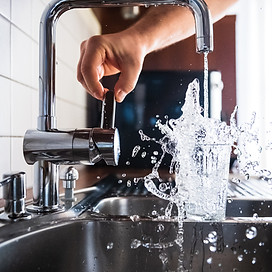Reducing the Toxic Load
Cleaning up your diet is one of the most powerful ways to reduce your toxic load, but it’s not the only one. The products we use on our bodies and in our homes can also have a significant impact on our health. Many contain harmful chemicals that contribute to our daily "toxic load", which is the total burden of toxins the body has to process and eliminate.

Organic Produce
Choosing organic can help reduce your toxic load because it limits your exposure to synthetic pesticides, herbicides, and other chemicals used in conventional farming.
Organic isn’t always essential and it can be more expensive. I buy organic when I can, but when I can’t, I make sure my fruit and veg are soaked in bicarbonate of soda to help remove pesticide residues.
Focus on seasonal produce and buy from local growers, even if they don’t have official certification. For small-scale farmers or market gardeners, the cost and paperwork can be too much, even if they follow organic principles. That’s why many will say things like 'grown without pesticides' or 'chemical-free' instead of 'organic.'
Use guides like 'The Dirty Dozen' and 'Clean Fifteen' to decide when organic makes the biggest difference, especially for foods with thin skins or high pesticide residues.

Kitchen Equipment
Plastics can release unwanted chemicals into food, especially when heated or storing oily or acidic foods. These chemicals can affect hormones and harm health. Stick to what your granny (or great granny) used, to keep it simple and safe. I changed my kitchen equipment gradually over time to the following:

Cookware:
Swap for stainless steel, cast iron or enamel coated
Food storage:
Use glass jars, glass containers or stainless steel lunchboxes
Chopping boards:
Use boards made from wood, bamboo, granite or glass
Utensils:
Swap plastic for stainless steel or wood
If using plastic:
Choose BPA-free, food safe types. Avoid hot food or microwaving.

Toiletries & Skincare
Switching to more natural toiletries and skincare doesn’t have to be all or nothing. Start by avoiding ingredients like parabens, phthalates, and synthetic fragrances, and choose products labelled 'fragrance-free' or 'unscented'.
Many creams and shampoos are absorbed through the skin, so cleaner options can help reduce exposure to unwanted chemicals.
I began by swapping my regular deodorant for a natural deodorant with no aluminium, I then swapped my shampoo for a rice water bar. I have now moved on to a completely new skincare routine. You can also look at using products like shea butter, coconut oil and olive oil.
These days, there are more independent brands than ever making affordable, natural products, so it’s easier to make gradual changes that suit your budget.

Cleaning Products
Switching to less-toxic cleaning products can be simple, affordable and surprisingly effective. Start by cutting back on products with bleach, ammonia, and synthetic fragrances, as these can release harmful fumes and irritate skin and lungs.
Look for eco-friendly brands or make your own cleaners from basic ingredients like bicarbonate of soda, white vinegar, and lemon juice.
When I began reducing toxins in my home, I swapped my all-purpose spray for a homemade version and it worked just as well.
Nancy Birtwhistle is my go to resource for homemade cleaning products. I can't recommend her enough! Her Instagram is full of really useful tips that actually work. I also have her book 'Clean & Green'.


Water
-
Stay hydrated to support your body’s natural detox
-
Drink 1.6 to 2 litres of fluids daily
-
Use a water filter


Fire
-
Choose candles made from beeswax, soy, or coconut wax
-
Use unscented or ones scented with essential oils


Air
-
Open the windows in your home regularly
-
Breathe through your nose
-
House plants can improve air quality indoors